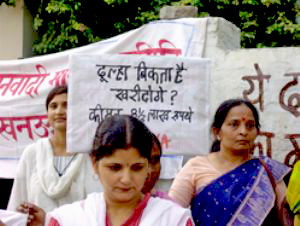
New Delhi, September 1: The women and child development (WCD) ministry is seeking life term for those convicted in dowry death cases.
WCD minister Krishna Tirath on Friday said, "I will write to the law ministry to enhance punishment for those convicted in dowry death cases to life imprisonment." She also proposed separate fast-track courts for disposal of cases involving women.
In 2011, 8,618 dowry death cases were reported across the country. The ministry is pushing for an all-India cadre of protection officers for women. "We are seeking the Planning Commission's concurrence in this," Tirath said. The Centre would bear 75% expenses, and the rest (25%) will be borne by state governments.
The ministry also plans to make dowry laws more stringent by amending the existing law. It proposed to make listing of wedding gifts compulsory for the bride and the groom. "The list should be submitted in a sealed cover to the dowry prohibition officer. It will be strictly confidential," said Tirath. The list will be submitted in court if required.
On Thursday, she met women MPs to discuss amendments to the Dowry Prohibition Act, 1961. The MPs suggested that if a bride dies, her wedding gifts should go to her parents or children. In case, she does not have parents or children, the gifts would become state property.
The ministry also proposes to be more lenient to those who give dowry. Now, those who give dowry and those who accept it face five years in jail. Amendments propose to reduce jail term for dowry givers to one year. Those who accept dowry would, however, be punished with a minimum of five-seven years in jail, said Tirath. The proposal was supported by MPs, including Samajwadi Party's Jaya Bachchan and Akali Dal's Harsimrat Kaur.
There will also be provisions to enable women to lodge complaint at a police station near her residence where she is staying after leaving her marital home.
During the consultation also proposed registration of all marriages, especially those involving NRIs, and putting them up on a website. "We want the families to inform the government about weddings with NRIs," said Tirath.
Drawing flak for delay in amendments to dowry laws, Tirath hoped it would be ready in six months. The Protection of Women against Sexual Harassment at Workplace Bill is likely to come up in Parliament on Monday.





Comments
Add new comment